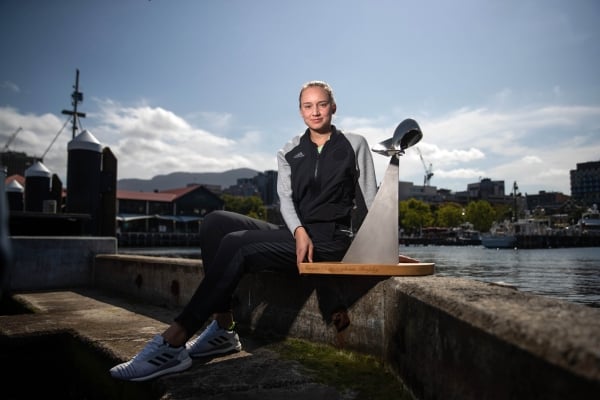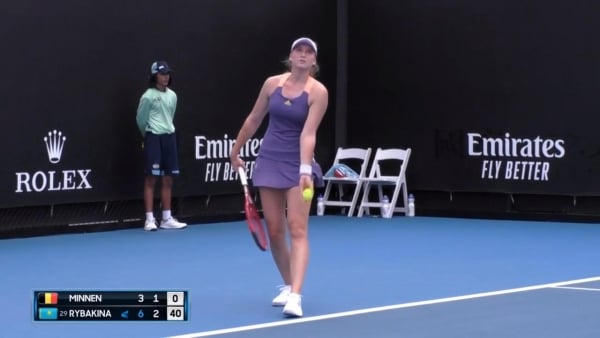Elena Rybakina’s rise to the top of the women’s game has been so rapid that the 20-year-old Kazakh has only had a full-time coach for less than a year.
Twelve months ago Rybakina was virtually unknown as she lost in straight sets in the first round of qualifying at the Australian Open. A year on, the Russian-born Kazakh remains relatively anonymous among the top players but she’s begun 2020 as one of the world’s in-form players, reaching a final in Shenzhen and winning the Hobart title.

The name of Rybakina could soon be rather more familiar. She is seeded No.29 in Melbourne Park, and is now gearing up for a blockbuster showdown with world No.1 Ashleigh Barty on Friday after two impressive straight-set wins.
“I think I’ve improved every six months,” said Rybakina, who has gone from being the world No.450 to the top 30 in just two years.
“My ranking has gone up so fast, which is great, but it’s all been really fast for me. I’ve only had a private coach travelling with me since last February. He’s helped me a lot, tactically we talk about every player, and he’s made some technical improvements to my serve and forehand. We’re working on every little detail.”
It is only a couple of years since Rybakina was having to share a court with up to three other players during training sessions, as she endeavoured to combine the demands of high school in her native Russia with forging the beginnings of a career on the professional tour.
“When I was a junior, I didn’t practice so much,” said Rybakina.
“I’d be doing maybe two hours tennis and three hours of fitness a day, but it was always in a group. Until I was 15, there would be seven maybe eight of us sharing a court and even when I was 17, 18 it would be a group of four. It was not so professional.”
Amid such modest beginnings, Rybakina’s immense natural talent began to flourish. She reached the semifinals of both the Australian Open and French Open girls' tournaments in 2017, but despite her undoubted potential, her family were initially concerned about the idea of a full-time tennis career.
“My dad wanted me to go to university in the US,” remembered Rybakina.
“I had some really good offers from various colleges out there but I knew that I wanted to turn professional. We weren’t exactly fighting but both my parents were not sure. They saw the results and that I wanted to try, but they knew it could be difficult financially, and like all parents, they were scared about injuries and things like this.”
As a result, until the age of 18, Rybakina combined travelling the lower reaches of the tennis world with the demands of completing her education back home in Moscow.
She vividly remembers making the semifinals of one junior tournament and sitting a maths exam the very next day.
“It was not easy at all because it was regular school, not some kind of academy for athletes,” she said.
“I had to go every day and in the final year in Russia it’s not easy to skip things. Every time after I played a tournament, I had to go to sit some tests. I managed to finish and now my parents are supporting me. But I only decided to be a full-time professional around one and a half years ago.”
With a powerful serve, the six-foot Rybakina has the ability to make life distinctly uncomfortable for Barty on Friday. It is a mark of how new she is to the higher echelons of the women’s game that it will be only the first time she’s shared a court with a member of the world’s top 10 – losing to then world No.4 Kiki Bertens in ‘s-Hertogenbosch last June and playing nine games against Simona Halep in Wuhan before the Romanian retired injured.
However, Rybakina is simply excited about her prospects for 2020 after enjoying what she describes at the best pre-season she’s ever had.
“I’ve started the year so well,” she said.
“It helped me a lot because I had six weeks for pre-season. It’s the first time I’ve ever had that long. It made a real difference.”
